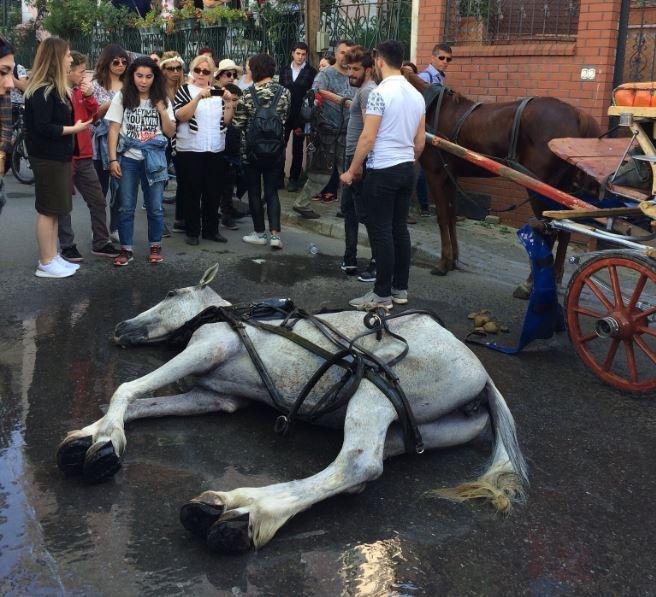
Anger has been sparked once again over the poor condition of horses used to pull carriages on Istanbul’s Büyükada, the largest of the Princes’ Islands, after footage emerged of a horse that had collapsed and fallen to the ground in exhaustion.
Footage of the injured horse went viral on social media over the weekend, sparking condemnation from the public and fresh calls to ban the use of horses on Büyükada, where they are often kept in shocking conditions by owners who use them for tourists visiting the island.
Around 1,500 horses are used for transportation purposes on the Princes’ Islands, where vehicular traffic is banned. They are particularly popular among day-tripping tourists visiting the island.
Despite the widely condemned poor condition of the horses on Büyükada, there are no treatment centers on the island and there are no works underway to keep the hundreds of badly treated horses healthy, daily Cumhuriyet reported on April 24.
The horses used to pull carriages in places like the Princes’ Islands have an average life expectancy of just two years, rather than the average 20 years for healthy horses, according to a report from an animal rights group, news website Bianet reported in May 2017.
“The approximate life expectancy for horses is 20 years. But the life expectancy of horses used with carriages [on Büyükada] is just two years after they start working,” said Elif Narin, an activist from the “Don’t Ride Phaetons, Horses Are Dying” initiative.
The Animal Rights Watch Committee (HAKİM) issued a report last year about the state of horses used with carriages in Turkey, stating that 1,540 horses are being worked on 272 carriages on the Princes’ Islands, 230 of which are on Büyükada.
Some 400 horses die due to accidents or squalid conditions every year, the report stated, also stressing that horses are being used with carriages in popular tourist destinations such as İzmir, Antalya and Kuşadası.
“The number of 400 is just the number of dead horses buried by the municipality. But we know that a number of injured horses are also left to their fate in the forests. A number of horse corpses have been observed in the sea too. We estimate that 700 to 800 horses die every year,” she said.
“We have also heard a number of incidents in which injured horses are thrown from boats. We cannot know if these are genuine reports, but we have seen pictures of dead horses lying on the seabed,” Narin added.
It is unnatural for horses to run on steep hills like those on Büyükada, she stressed, adding that many horses also die from overeating.
“If they run after eating and drinking, they can experience ‘cracking.’ So they instead sometimes run without food and water. This is very distressing … Pregnant horses are also sometimes worked to run on the island,” she said.
Narin noted that the management of horse carriages has been monopolized and operating a carriage is now “like acquiring a license plate for a taxi.”
Electric carriages are often suggested as a possible alternative to horse carriages on the Princes’ Islands, and Narin also voiced support for this proposal.